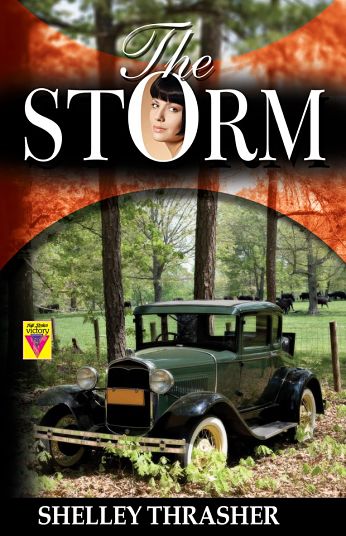The Storm

by Shelly Ann Thrasher
Self Published
288 pages
ISBN: 9781602827806B
(c) 2012
First Edition
Jacqueline "Jaq" Bergeron—New Orleanian, suffragist, freethinker—drove an ambulance on the battlefields of Europe during the Great War. She returns home and finds herself isolated in rural East Texas, keeping house for her war-hero husband as she awaits his promised divorce and plans her escape. But then she meets Molly.
Molly Russell lives for her music, which sustains her as she cares for her son and husband, and suffers her mother-in-law. When she meets Jaq, a world she never imagined opens to her—a world entirely out of reach.
With the storm of war still raging in Europe and other battles to be fought at home, can two women bound by the land and family ties find the freedom to love and build a life together?
History of the Book:
I set out to write this novel primarily to preserve my mother and grandmother’s stories of life on a large farm in the Bethel community, near Henderson, Texas. To prepare for it, I used family letters, photos, and genealogical records; oral history; and conventional research from books, articles, and online sources. One thread of The Storm focuses on the conflict between Molly and her mother-in-law and contains details of domestic life circa 1918. They appear milking the cow, feeding the chicken, making soap, going to church, talking on the front porch, cooking, entertaining in the parlor, etc.
In the book, Molly’s mother-in-law, Mrs. Russell, still runs the 1000-acre farm she and her husband bought just after the Civil War ended, when they migrated from western Georgia to East Texas. She reveals her softer side through her memories of her husband, a captain in the Confederate army, who died not long after the couple moved to Texas, leaving her to manage their new home and their seven children. These memories are based partially on courtship letters my great-grandfather, James Calvin Morris, wrote on the battlefield outside Atlanta. I also referred to a second group of letters between the couple during a lengthy separation on the trek from Georgia to Texas. My mother and four of her seven siblings, who lived with their grandmother (the inspiration for the Mrs. Russell character) during the 1920s, provided much of the information about her. I also devoted a one-semester sabbatical to researching women of the South.
Molly Russell is based on the life of my grandmother, Lottie Lee Russell Morris, who attended Chappell Hill Female College and studied music at Georgetown University. Her father, a Methodist minister both in the Austin area and in several small towns in East Texas, rode the last train out of Galveston before the Great Storm of 1900 demolished the town, and my grandmother recalled the weather conditions in League City, where she and the family lived at the time. Ill-equipped for life as a farm wife, my grandmother clashed with her mother-in-law, to say the least.
In addition to preserving family stories, I wanted to bring to life the major socio-political and technological climate of the WWI period on both a local and an international level. My totally fictitious heroine, Jaq Bergeron, not only lives through the Great Storm as a child, but she spends several years in England, joins the war effort in France as an ambulance driver during WWI, and works with suffragist leader Alice Paul in Washington, D.C.
Under Jaq’s influence, Molly registers to vote in the first election open to Texas women during the summer of 1918. (My mother says that my grandmother was the first woman in Rusk County to register to vote and relied on the local Jewish general-store owner to vouch for her, since she had no type of identification). In this scene, I portray what Henderson was like in 1918, and throughout the novel, I provide information about the rigors of automobile travel during this era. Jaq teaches Molly to drive her Model-T, which was a revolutionary, liberating invention for women. The telephone, the Brownie camera, the upright piano, and the wind-up phonograph all play an important part in the novel. WWI, the battle for women’s suffrage, and the influenza pandemic provide major international components. Characters’ memories of the Civil War and the 1900 Galveston hurricane ground it firmly in the history of the South and of Texas.
The most controversial aspect of The Storm is the fact that it focuses on the growing love between two women, Molly and Jaq. My grandmother’s youngest brother, David Riley Russell, a speech professor at SMU who published several books of poetry, served as poet laureate of Texas from 1945 to 1947. Though he married late in life, my mother and her siblings strongly suspect that he was gay. My mother adored him and always said he opened up the wider world of the arts and travel for her, so I paid tribute to his secret life by creating Molly and Jaq as lesbians. This tribute has, unfortunately, kept many local readers from accepting and appreciating the historical aspects of The Storm.
Basically, in The Storm, I try to portray both the local and the international milieu in which my Southern female characters work to resolve their various conflicts.
Shelly Ann Thrasher - March 30, 2015
Citation
Above was provided by the author.